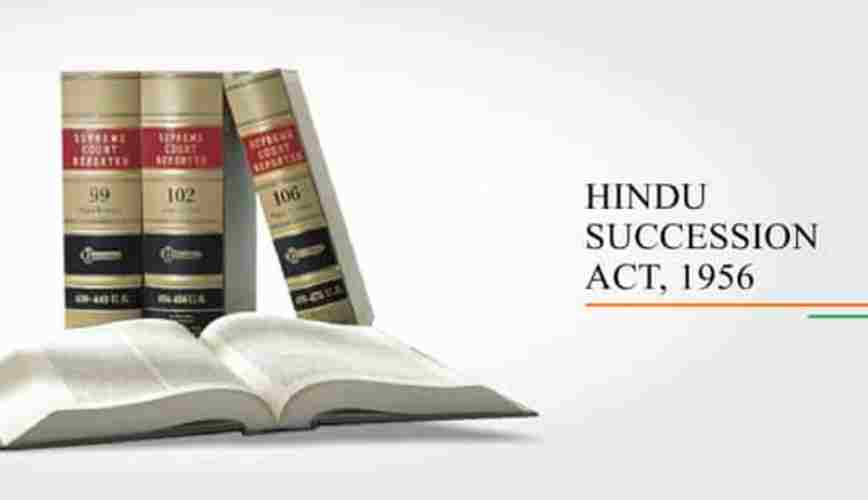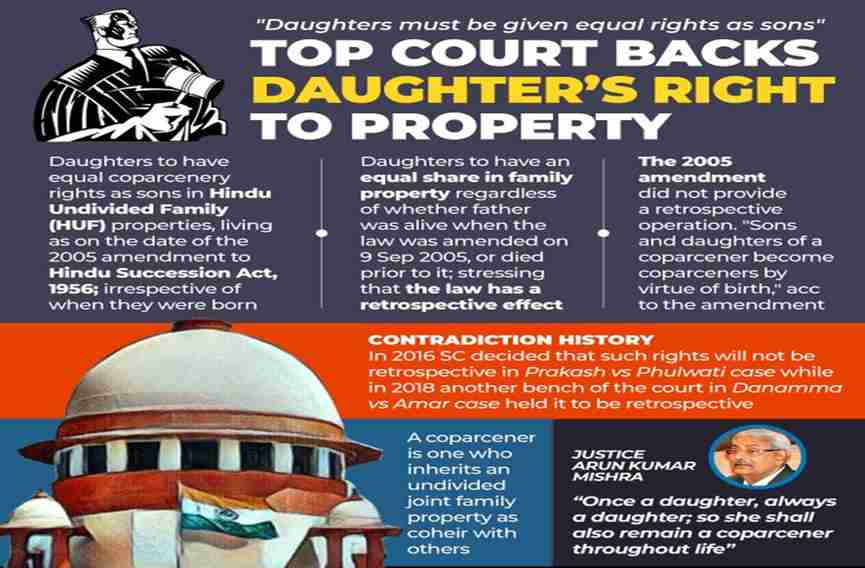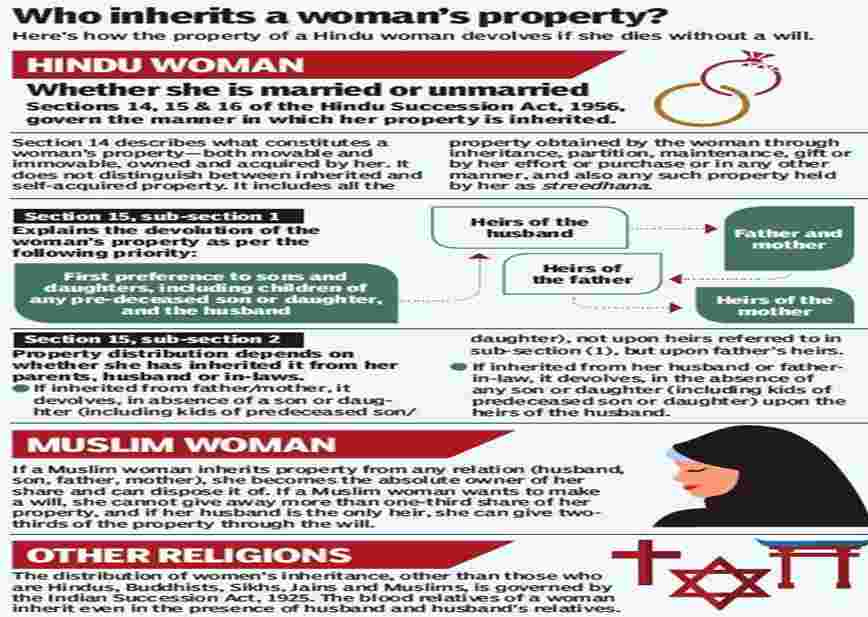- Umang Sagar
- Law, Recent article
Property Rights Of Daughters In India

Introduction
From the beginning of the world, women are treated as second-class citizens. They are permitted to the kitchen as their one and only duty is to cook and produce the children. They don’t have any rights but only duties to perform.
In India also, women i.e. daughters don’t have any property rights. women are always treated as inferior to men, both in terms of inheritance rights and the capacity to hold Property independently. There were many restrictions on women’s property rights and inheritance rights, which did not exist for women.
Women’s rights to inherit and own property in India have come a long way over the years.
Today the laws of inheritance have undergone significant reforms through legislation and amendments. Now, Daughters have an equal share in property and property rights.
What Is HUF?

- The HUF is Hindu Undivided Family means a family of people descended from a common ancestor and related to each other by birth or marriage. Daughters could only be part of this HUF till their marriage only.

The Hindu Succession Act, 1956

The Hindu Succession Act was developed to create uniformity in the succession of parental property and came into force on June 17, 1956.
Ironically, this law also highly favored male heirs.
According to the Hindu Succession Act, the female members of the family are considered as “members” who could have a share of the property and maintenance in lieu of the male members, but not ” coparceners ” or people who have legal rights to their ancestral property. They do not have the right to demand equal share and partition of ancestral property.
Who Is A Coparcener?
Under the Hindu succession law, the term coparcener denotes a person, who assumes a legal right in his ancestral property by her birth in a HUF.
The rights of coparceners and members in the property of the HUF are different. Coparceners have the right to ask for a partition of the property and to get the shares. Members of the HUF, like daughters and mothers, had the right of maintenance from HUF property, as well as to get a share in the property of the HUF as and when the partition of the HUF took place.

Coparcener was entitled to become the Karta of the HUF, daughters were not entitled to become a Karta of the HUF and manage its affairs.
This law did not provide any ancestral property rights to the married daughters, and because of that the daughter’s lost their right automatically when they are married off. The prevailing thought was that after marriage, the daughter becomes a part of someone else’s family, and hence giving her a share would alienate the property.
Daughter's Right In Property

Your gender as a woman does not place you at any significant disadvantage in the arena of inheritance rights.
As a daughter, you have the same inheritance rights as a son of this generation. Thus, a daughter has the same inheritance rights as a son; a granddaughter has essentially the same inheritance rights as a grandson, and so on.
Today the property rights of daughters are almost entirely the same as the property rights of sons. A daughter can acquire, hold, and dispose of, Property at par with any other man.
Today there are no restrictions on a woman’s capacity to acquire, hold and dispose of, her Property. Daughters have an equal share in their father’s self-acquired Property as well as ancestral property.
Daughters after the Supreme Court judgment of 2005 have become coparceners. Hence, they have equal rights in all Property, including agricultural lands. Both men and women are equally capable of holding their own, separate Property. Any restrictions on property rights are the same for all genders. Hence, daughters today have virtually equal rights in Property as a son does.
Hindu Succession (Amendment) Act ,2005

Section 6 of the Hindu Succession Act, 1956, which deals with the coparcener’s right in the HUF property, was amended in 2005. With this amendment, daughters are also entitled to get equal property rights as sons.
The daughter gets all the rights attached with coparcenary, including the right to ask for partition of the property and to become a Karta of the HUF
In the case of the deceased daughter, her children shall be entitled to the share that she would have received if she were alive on the date of the partition. In case none of her children is alive on the day of partition, her grandchildren will be eligible to receive her share.
What Are The Property Rights Of A Daughter As A Coparcener?
- The amendment came into effect on September 9, 2005.

A coparcener is a person who inherits legal rights in his ancestral property by birth in a HUF.
- Since the daughters also became the coparcener by the amendment. The following are the property rights of a daughter in an ancestral property;
- Share in the HUF property by birth.
- Demand partition in a HUF property.
- Be a Karta, if she is the eldest coparcener.
- Right to the succession of her share in the HUF property to her legal heirs if she dies intestate.
The property rights of the daughter regarding self-acquired property
In the case of a self-acquired property of a father or mother, their son or daughter has no birthright over it. If the father or the mother dies intestate, the devolution of the property takes place as per the Rules of Hindu Succession Act, 1956 under which the daughter is covered as a Class I heir and has an equal right along with the son(s) and other legal heirs.
Rights Of Daughters After Marriage

Daughters shall remain coparcener throughout life, irrespective of whether their father is alive or not. Hence even after their marriage the rights conferred to them by way of amendment shall continue to be part of their father’s HUF post-marriage.
Married and unmarried daughters have the same rights on their father’s property as their brothers. They are also entitled to equal duties and liabilities as their brothers.
The 2005 Amendment and the judicial decisions thereafter have clarified that a married daughter has a right over the property of her father, which is equal to that of her Son.
Equal Rights Of Daughters In Joint Family Property

- In Hindu Law, for an inheritance, Property is classified into two types;
- Joint Family Property and
- Self-Acquired Property.
- The property inherited by a son from his father and from his paternal grandfather and paternal great-grandfather is considered Joint Family Property. All other Property is considered Self-Acquired Property. Depending on where you reside in India, the character of these types of properties is either the same or different. In regions where this distinction is followed:
- Joint Family Property is inherited differently (compared to Self-Acquired Property).
- Multiple persons have rights over the Joint Family Property by birth. This is unlike Self-Acquired Property; over which rights can be acquired only if you have acquired them yourself.
The rights of both sons, and daughters, to inherit acquire, hold, and dispose of the Self-Acquired Property of their ancestors is essentially the same everywhere.
- With the enactment of the Hindu Succession (Amendment) Act, of 2005, sons and daughters now have equal rights to inherit the Joint Family Property of their ancestors.
Inheritance Rights Of Daughters Under Muslim, Christian, And Parsi Laws

People belong to different religions and faiths in India, it is difficult to apply just one set of laws and rules in respect of matters related to family affairs. Such matters are governed by personal laws for different religions, for both males and females.
- The Indian Succession Act was enacted in 1926 with the object to consolidate the enormous number of laws that existed in relation to inheritance and succession.
1. Inheritance Laws for Christians
Christians (and Jews) are governed by the Indian Succession Act, of 1925, specifically by Sections 31 to 49 of this Act. Under this Act, Christians inherit equally, irrespective of gender. If the father or mother dies intestate, a daughter would inherit equally as her brother(s).
- In case the deceased has left behind a widow and lineal descendants, a widow will get one-third share in his estate and the remaining two-thirds will go to the lineal descendants. If there are no lineal descendants but the other kindred is alive, she will get half of the share and if the case is that she is the only one surviving, without any kindred or lineal descendants, the whole estate will belong to the widow.
2. Inheritance Laws for Parsis
- For Parsis, the Indian Succession Act, of 1925 is applicable for matters of intestate succession – specifically Sections 50 to 56 of this Act. Even for Parsis, both males and females inherit equally, irrespective of gender.
3. Inheritance Laws for Muslims
- For Muslims, in case of non-testamentary succession, Muslim personal laws apply – as per the Muslim Personal Law (Shariat) Application Act, 1937. Muslim laws for succession are not codified and there are four sources of personal Islamic law that govern the same – the Holy Quran, the Sunna, the Ijma, and the Qiya. There are two types of heirs in Muslim law- the Sharers (ones entitled to a certain share in the deceased’s property) and the Residuary (the ones who take up the share in the property that is left over after the sharers take their part). Inheritance of property in Muslim law comes only after a person dies and not by birth, unlike under the Hindu Succession Act. Muslim law does not create any bias between the rights of men and women. Once the ancestor dies, both the female and male individuals become legal heirs of the inheritable property. However, it has been seen that the quantum of share is double for Muslim males as compared to Muslim females. The reason for this is that the women receive Mehr and maintenance from their husband and the males, on the other hand, are duty-bound to maintain their wives and children
Landmark Cases On Recognition Of Property Rights Of Women In India
Through the following cases, let’s understand the judicial journey of how the battle of recognizing women’s property rights in India was finally won.
1. Mary Roy v. State of Kerala (1986)
Mary, a Christian widow staying at her father’s house in Travancore was harassed and forced by her brothers to evacuate the property. As she had no other place to go, she refused to leave the house. Her refusal led her brothers to hire some goon to threaten her. The contention of the brothers was that the property belonged to them according to the Travancore Succession Act, 1916 (the Act). They relied on Section 24 of the Act which stated that a widowed mother has a life interest in the property and that a married daughter who received Stridhan has no right to it.
Mary’s case against her brothers to get equal rights on her father’s property was denied by the Lower Court. However, the High Court ruled in her favour and held that she has equal rights over the property.
Nevertheless, even after getting her right acknowledged, the harassment of her brothers did not stop. So, she approached the Supreme Court under Article 32 of the Constitution of India challenging the constitutionality of Section 24 of the Act.
Upholding Mary’s rights, the Supreme Court held that-
- Section 24 of the Act violates Article 14 of the Constitution of India.
- No personal law is above the Constitution of India;
- Any Act that invalidates the provisions of the Constitution of India is void;
- The Indian Succession Act, 1925 will apply in the present case, instead of the Act;
- One-third of the father’s property will be Mary’s.
- This case proves to be one of the breakthrough decisions relating to the equal rights of Indian Christian sons and daughters on the father’s property.
2. Madhu Kishwar & Ors. v. State of Bihar & Ors. (1996)
- In this case, the constitutionality of certain provisions of the Chota Nagpur Act, of 1908 was challenged. It was contended that the provisions favoured males belonging to the Scheduled tribes in the succession to property. The court held a few of the impugned provisions unconstitutional.
3. Prakash v. Phulavati (2016)
In this case, the respondent (Phulavati) had initially filed a partition suit before the Trial Court in 1992, after her father’s death. She claimed a 1/7th share in the properties that her father acquired from his mother. While the suit was still pending, the Hindu Succession (Amendment) Act, 2005 was made effective. The Amendment gave coparcenary rights to the daughters as well. Phulavati used the opportunity; she amended her previous claim as per the 2005 Amendment. The Trial Court only partly allowed her suit.
Following the Trial Court’s order, Phulavati approached the High Court stating that she, being a coparcener as per the 2005 Amendment, has a share equal with her brothers in the father’s property. The appellant (Prakash, Phulavati’s brother) contended that the 2005 Amendment will not apply in the present case, as the father died prior to 2005. The High Court ordered in Phulavati’s favour and allowed the retrospective effect of the 2005 Amendment.
Aggrieved by the High Court’s decision, Prakash approached the Supreme Court. Finally, the Supreme Court overruled the High Court’s decision and held that the 2005 Amendment will not apply to any partition which was affected before its enactment.
4. Danamma v. Amar Singh (2018)
In this case, the appellants were the two daughters of the Late Shri Gurulingappa Savadi and his widow, Sumitra. The couple also had two sons, Arun Kumar and Vijay. Amar Singh, the son of Arun Kumar, filed the partition suit claiming a one-fifteenth share in Savadi’s property. His claim was based on the fact that the property was in the possession of the two sons and the widow. He contended that the two daughters were not the coparceners, as they were born prior to the enactment of the Hindu Succession Act, 1956 as amended in 2005 (the Act). Following the Trial Court’s decision favouring Arun Kumar, the appellants approached the High Court challenging the decision. The High Court upheld the Trial Court’s decision, following which the appellants approached the Supreme Court.
The Supreme Court, however, held that Section 6 of the Act has a retrospective effect on the devolution of coparcenary property. Daughters are coparceners, irrespective of whether the father died before or after the 2005 Amendment. Ultimately, the contended was equally divided into five shares, one each for the two sons, two daughters, and the widow.
Hence, this case established the retrospective effect of the Act on the coparcener ship of women with regards to the father’s date of death.
5. Vineeta Sharma v. Rakesh Sharma (2020)
In this case, the appellant’s father died in 1999. She had three brothers and a widowed mother. One of her brothers died unmarried in 2001, after which she filed a suit claiming a coparcener ship and one-fourth share in her father’s property. But, the High Court rejected her claim stating the fact that her father died before the 2005 Amendment.
The High Court’s decision brought confusion to the retrospective effect of the 2005 Amendment because of the two previous contradicting decisions in the cases Danamma v. Amar Singh (2018) and Prakash v. Phulavati (2016).
Clarifying this chaos, a three-judge bench of the Supreme Court led by Justice Arun Mishra gave a landmark verdict on the 11th of August 2020. The bench upheld its decision in the case of Danamma v. Amar Singh and overruled Prakash v. Phulavati. It held that a daughter is considered a coparcener by birth, irrespective of whether her father is alive or not. Further, the retrospective effect of the 2005 Amendment was also upheld and well-settled in this case.
Conclusion
- Women in India were treated as second-class citizens over many generations and confined to home only but over the years and in 21 St century, there is the change they came out from the restrictions, which are imposed upon them and proved that they are equal to men, but nothing less compares to them. In India, over generations, women are not given any property rights. They are merely treated as members of the family only. But then over time, they fought for their right so only sons but not daughters also should be given equal rights and share in the property. Then in 2005, they are given equal property rights and now they are equal to men nothing less to them.
Top 13 Facts About Property Rights Of Daughters
The women in India don’t have any property rights until 2005 but after the Hindu Succession Amendment Act,2005 they got equal rights as men.
In HUF i.e Hindu Undivided Family means a family of people descended from a common ancestor and related to each other by birth or marriage. The daughter could only be a member of HUF until their marriage only.
The HINDU SUCCESSION ACT, of 1956 came into force on June 17, 1956. Ironically, this law also highly favored male heirs.
According to The HINDU SUCCESSION ACT,1956 the females are “members ” only who can claim maintenance but” not coparceners” i.e who have legal rights to their ancestral property.
Before the 2005 judgment, daughters are not coparceners and cannot become the Karta of the family but after the judgment, it changed.
Section 6 of the Hindu Succession Act, 1956, which deals with the coparcener’s right in the HUF property, was amended in 2005. With this amendment, daughters are also entitled to get equal property rights as a son.
After 2005, Both married and unmarried have the same rights to the father’s property as their brothers. They are also entitled to equal duties and liabilities as their brothers.
With the enactment of the Hindu Succession (Amendment) Act,2005 the females have the same right as males to inherit, acquire, hold and dispose of the ancestral property or the joint family property of their ancestors.
The Hindu Succession (Amendment) Act came into effect on September 9, 2005.
According to Christian inheritance laws also the daughters will get an equal share as their brothers and if the widow is there still she will get her share along with the lineal descendants and only the widow who is there will get the whole property.
According to The Indian Succession Act,1925 applicable for matters of intestate succession in the Parsis community too. Both females and males inherit equally irrespective of gender.
There are two types of heirs in the Muslim community i.e., the sharers (ones entitled to a certain share in the deceased’s property) and the Residuaries (the ones who take up the share in the property that is left over after the sharers take their part).
Inheritance of property in Muslim law comes only after a person dies and not by birth. Once the ancestor dies, both the female and male individuals become legal heirs of the inheritable property. However, it has been seen that the quantum of share is double for Muslim males as compared to Muslim females because they receive Mehr and maintenance from their husbands.




